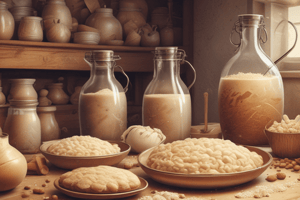Podcast
Questions and Answers
What is lean dough?
What is lean dough?
A dough that is low in fat and sugar.
What is rich dough?
What is rich dough?
A dough that is high in fat, sugar, and sometimes eggs.
What is laminated dough?
What is laminated dough?
A dough in which fat is incorporated into the dough in many layers by using rolling and folding procedure.
What is the pickup stage?
What is the pickup stage?
What is the cleanup stage?
What is the cleanup stage?
What is the initial development phase?
What is the initial development phase?
What is the final development phase?
What is the final development phase?
What is the straight dough method?
What is the straight dough method?
What is sponge?
What is sponge?
What is yeast starter?
What is yeast starter?
What is yeast preferment?
What is yeast preferment?
What is a short mix?
What is a short mix?
What is an improved mix?
What is an improved mix?
What is an intensive mix?
What is an intensive mix?
What is gluten window?
What is gluten window?
What is extensibility?
What is extensibility?
What is elasticity?
What is elasticity?
What is the tenacity of a dough?
What is the tenacity of a dough?
What is fermentation?
What is fermentation?
What is young dough?
What is young dough?
What is old dough?
What is old dough?
What is punching?
What is punching?
What is rounding?
What is rounding?
What is benching?
What is benching?
What is hearth bread?
What is hearth bread?
What is proofing?
What is proofing?
What is oven spring?
What is oven spring?
What is wash?
What is wash?
What is short dough fermentation?
What is short dough fermentation?
What is long-term fermentation?
What is long-term fermentation?
What is retarding?
What is retarding?
Flashcards are hidden until you start studying
Study Notes
Understanding Yeast Doughs
-
Lean Dough: Low in fat and sugar; focuses on basic ingredients for bread-making.
-
Rich Dough: Contains high levels of fat, sugar, and sometimes eggs; used for richer pastries and desserts.
-
Laminated Dough: Dough with multiple layers of fat, created through rolling and folding; used for pastries like croissants.
-
Pickup Stage: Initial mixing phase where dry ingredients are hydrated with liquid; essential for dough formation.
-
Cleanup Stage: Second mixing phase where dough forms a compact mass that separates from the bowl.
-
Initial Development Phase: Initial formation of dough appears rough and under-mixed; early gluten development.
-
Final Development Phase: Last mixing stage where gluten becomes strong, resulting in smooth, elastic dough.
-
Straight Dough Method: Simplest mixing method; all ingredients combined at once without any pre-fermentation.
-
Sponge: A yeast dough mixing method with pre-fermented yeast and flour; adds depth to flavor and texture.
-
Yeast Starter & Preferment: Terms referring to pre-fermented yeast mixtures used to enhance dough fermentation.
-
Short Mix: Mixing technique with minimal time, emphasizing longer fermentation for flavor and texture development.
-
Improved Mix: Medium mixing time and fermentation; balances dough structure and flavor.
-
Intensive Mix: Long mixing and short fermentation time; produces dough with strong gluten structure.
-
Gluten Window Test: Method to assess gluten development by stretching dough; smooth window indicates proper development.
-
Extensibility: Ability of dough to stretch easily; important for shaping and final product structure.
-
Elasticity: Property of dough that causes it to spring back when stretched; crucial for maintaining shape.
-
Tenacity: Resistance to stretching; indicates dough strength, affecting overall texture.
-
Fermentation: Yeast's metabolic process converting carbohydrates into alcohol and carbon dioxide; vital for leavening.
-
Young Dough: Dough not fermented enough, leading to subpar texture and flavor.
-
Old Dough: Over-fermented dough; results in undesirable flavors and poor structure.
-
Punching: Also known as folding; technique to redistribute gases and strengthen dough.
-
Rounding: Process of shaping dough into smooth balls; prepares for final shaping and proofing.
-
Benching: Resting preshaped dough, covered, for optimal gluten relaxation before shaping.
-
Hearth Bread: Baked directly on oven floor; creates a crusty exterior and unique flavor profile.
-
Proofing: Continuation of yeast action post-shaping; increases volume and enhances texture.
-
Oven Spring: Rapid dough rise in the oven due to gas expansion; contributes to final loaf height.
-
Wash: Liquid applied to dough surface before baking; enriches color and texture of crust.
-
Short Dough Fermentation: Quick proofing (1-2.5 hours at 90°F) for yeast activity and texture.
-
Long Term Fermentation: Extended proofing (4-5 hours or more at 75°F) encourages complex flavors; involves multiple folds.
-
Retarding: Refrigeration technique to slow yeast activity; controls fermentation rate for better flavor.
-
Retarder Proofer: Equipment designed to create ideal conditions for slow fermentation and proofing.
Studying That Suits You
Use AI to generate personalized quizzes and flashcards to suit your learning preferences.




